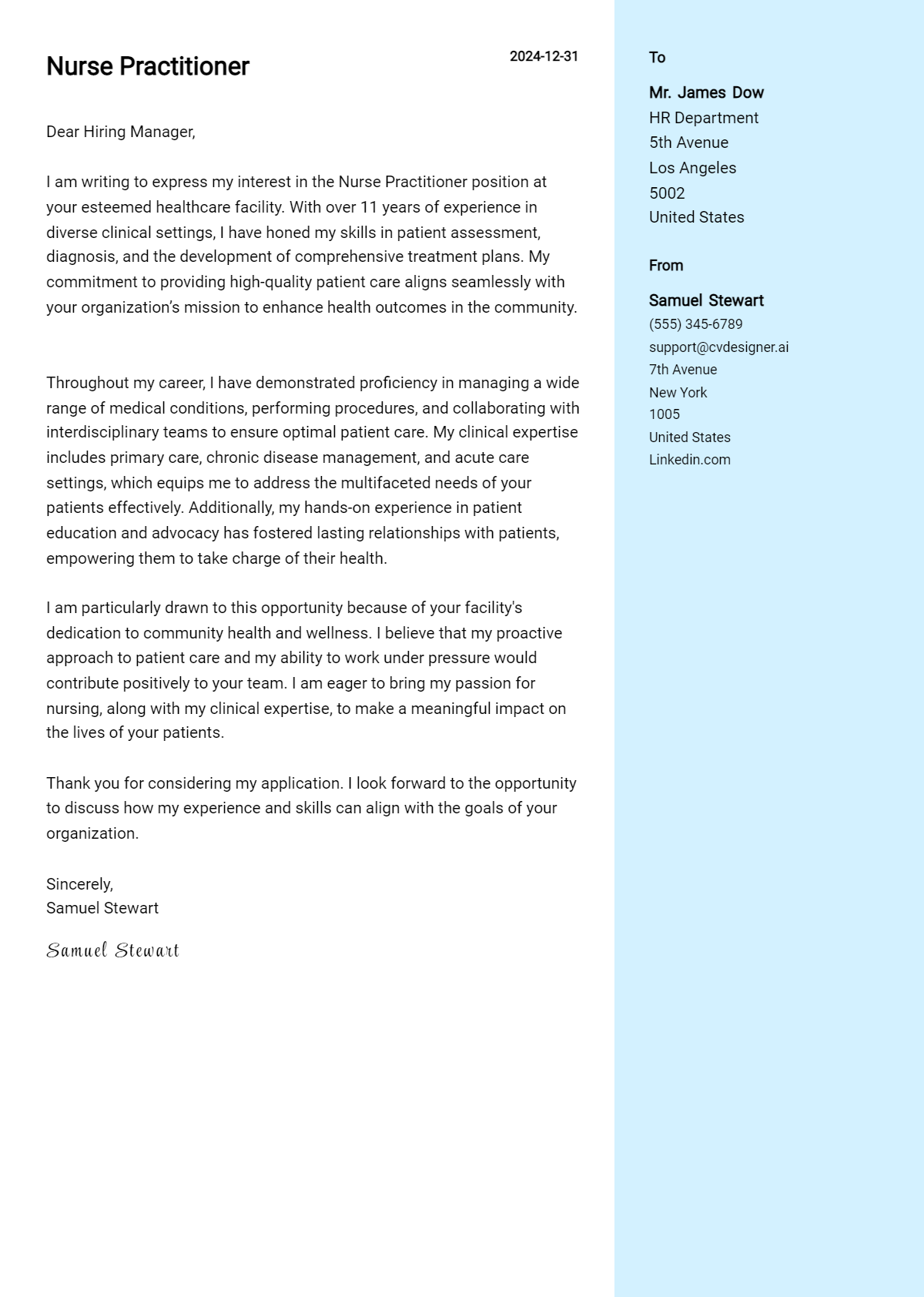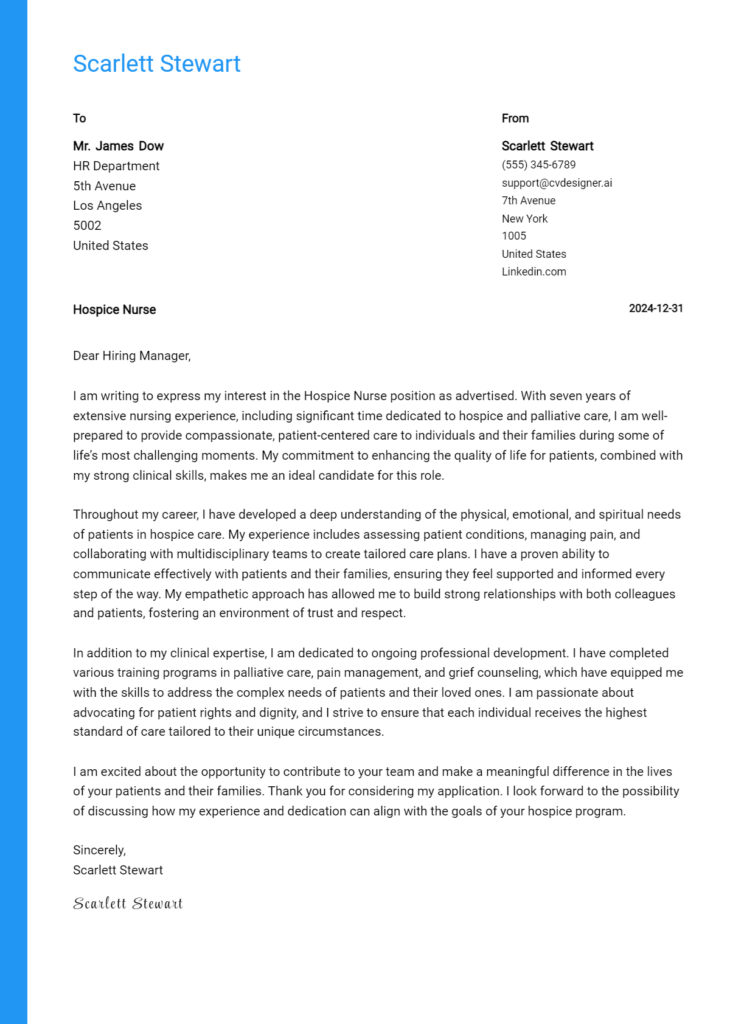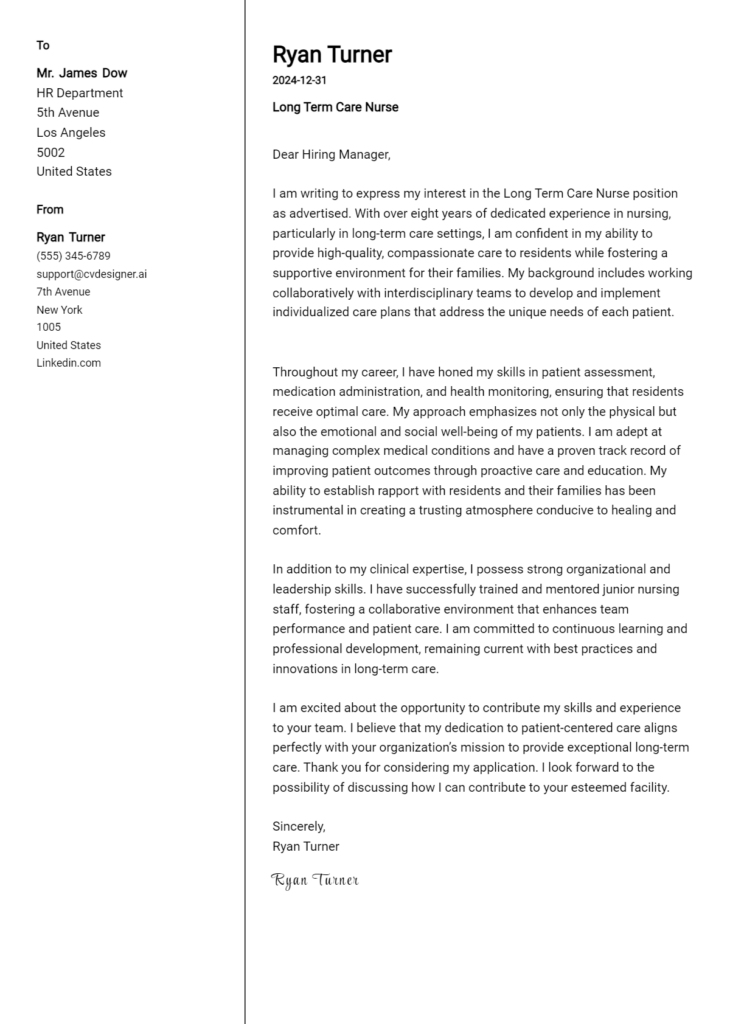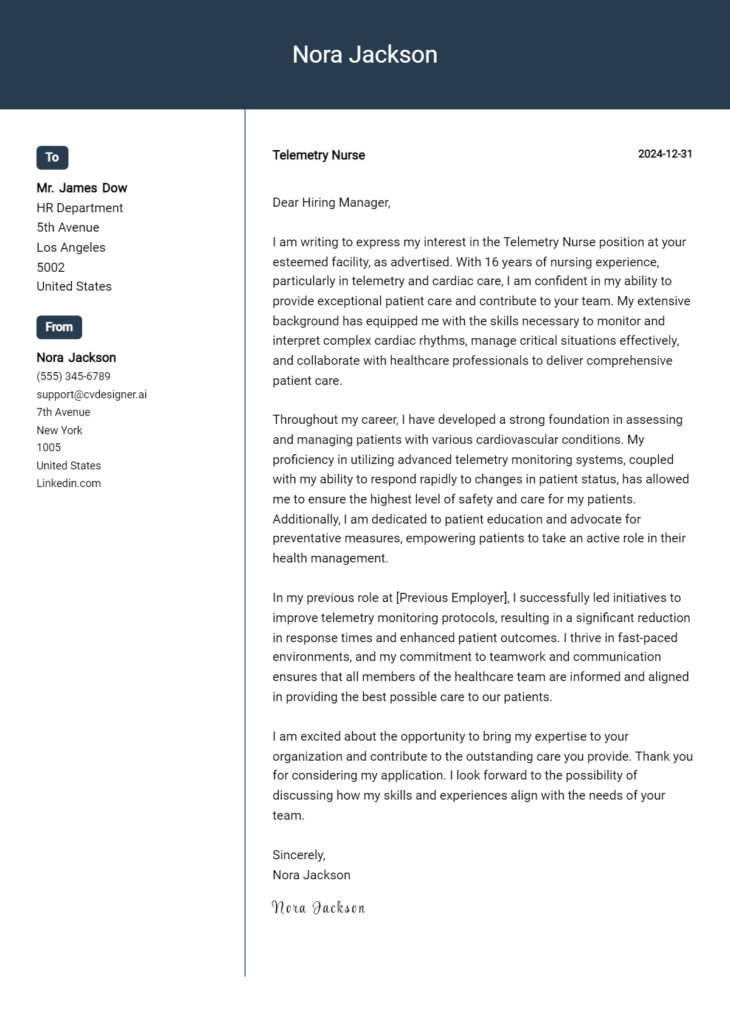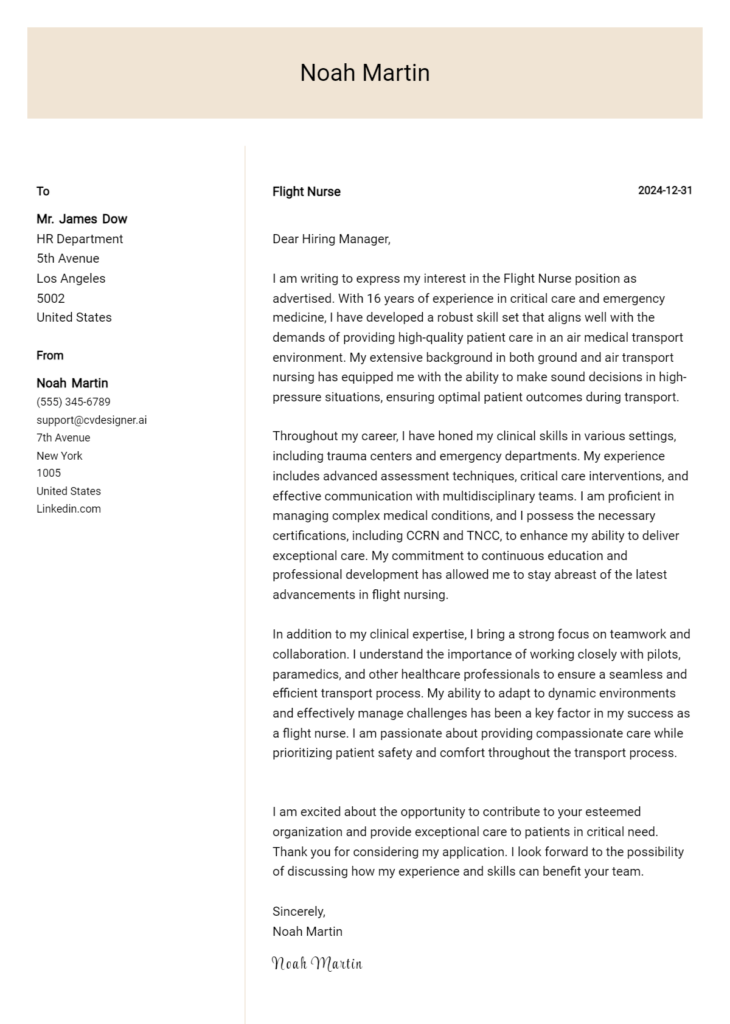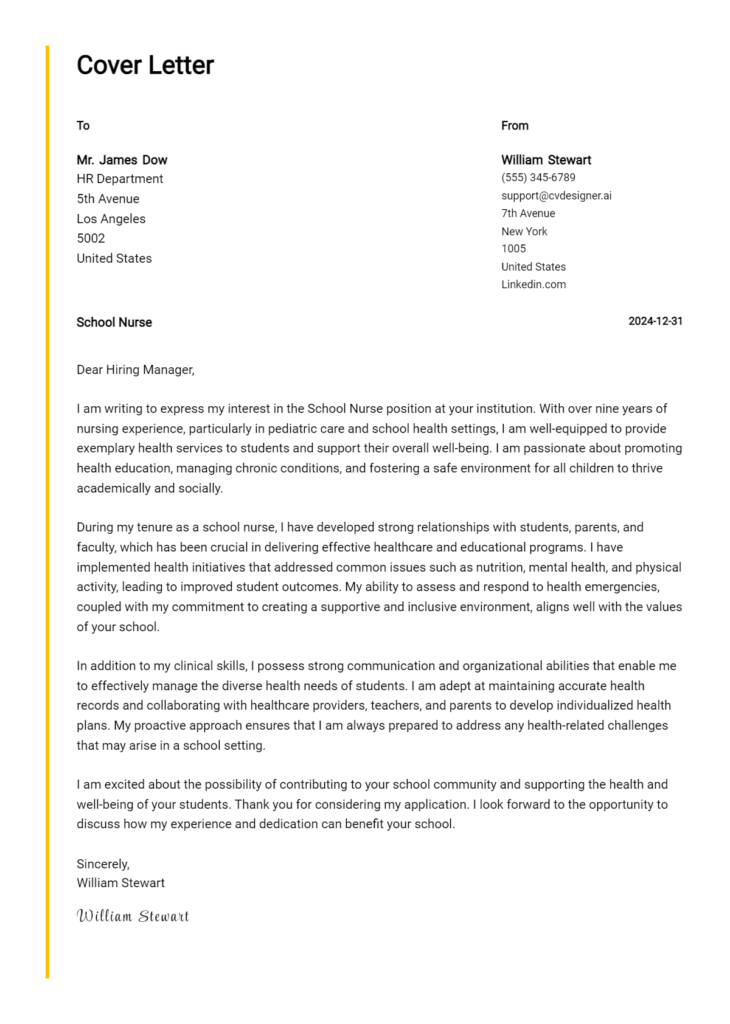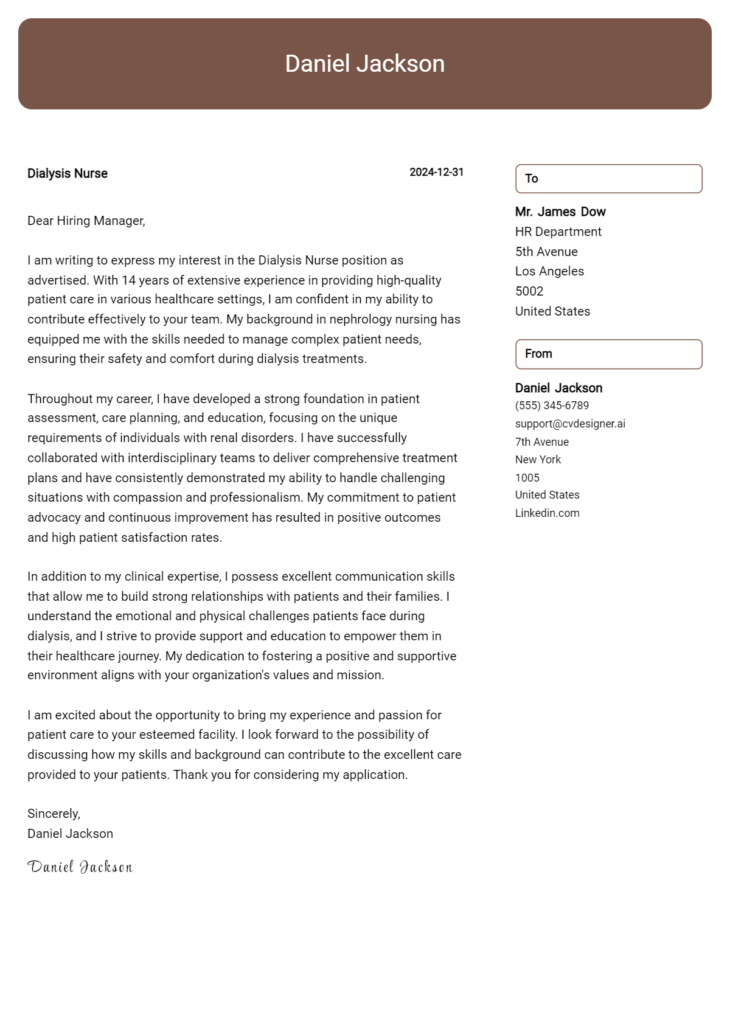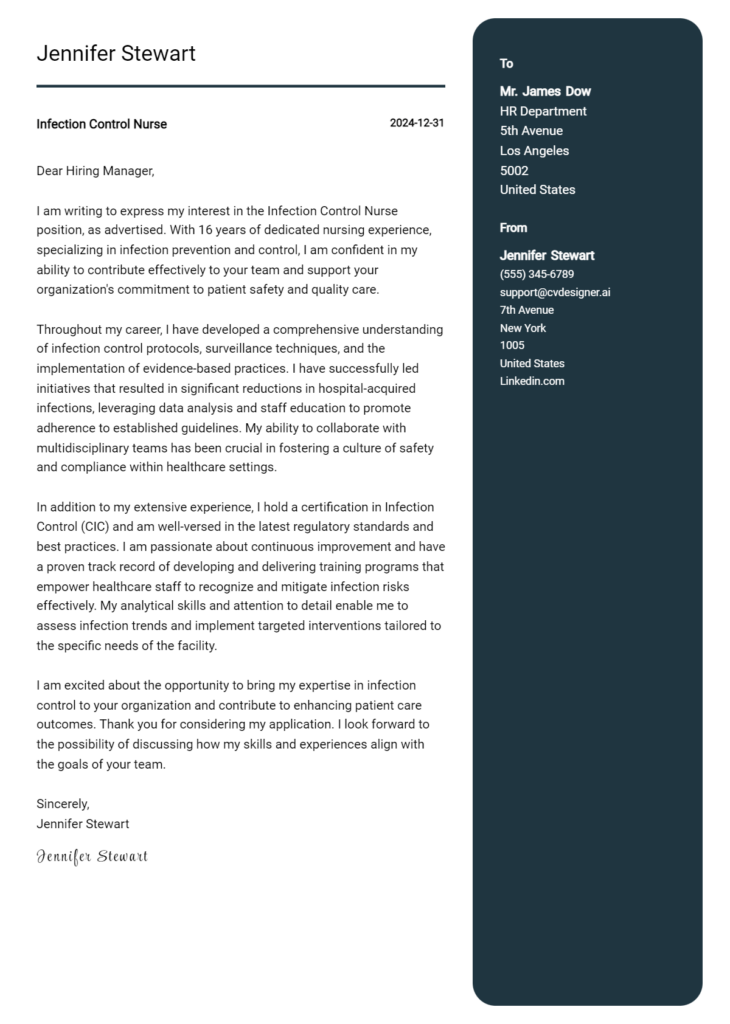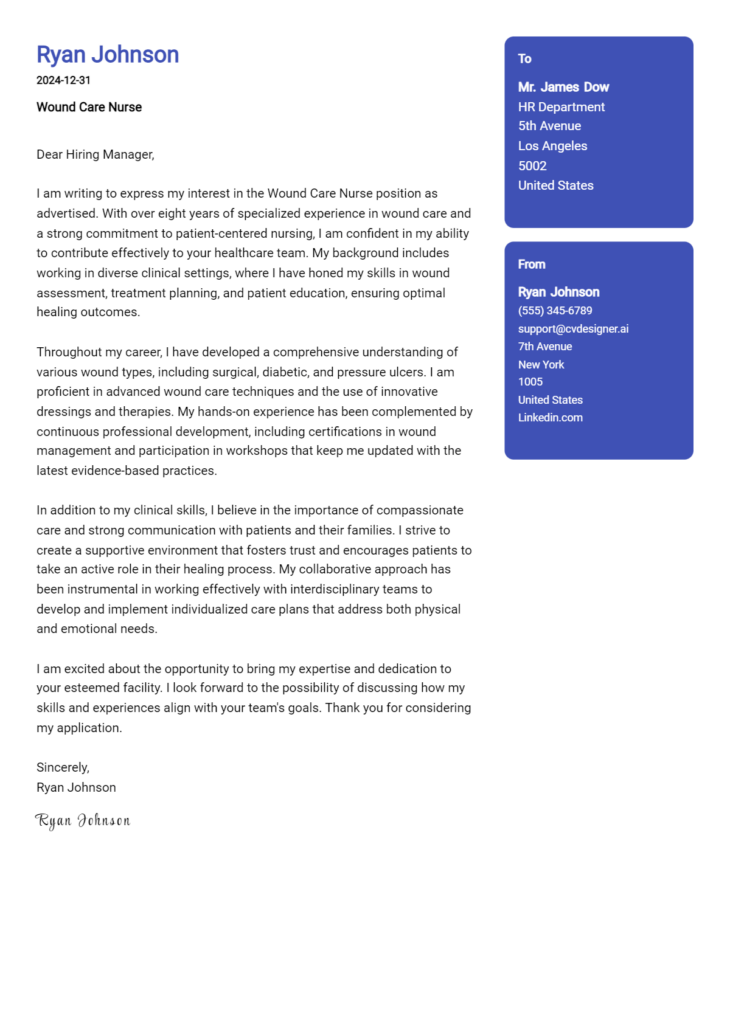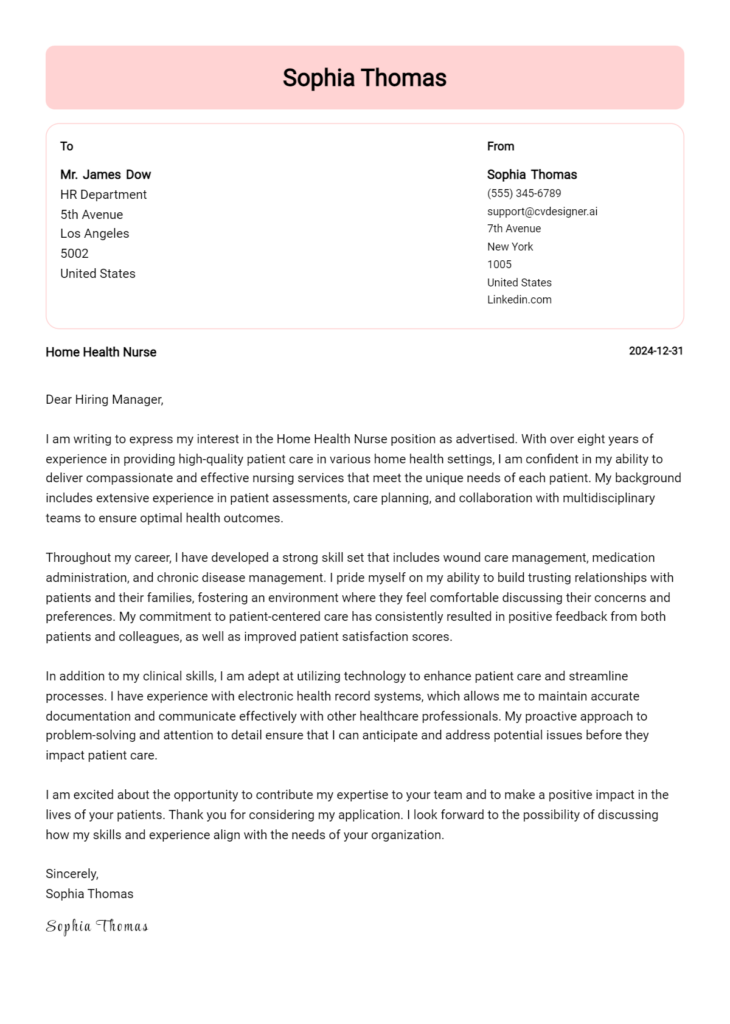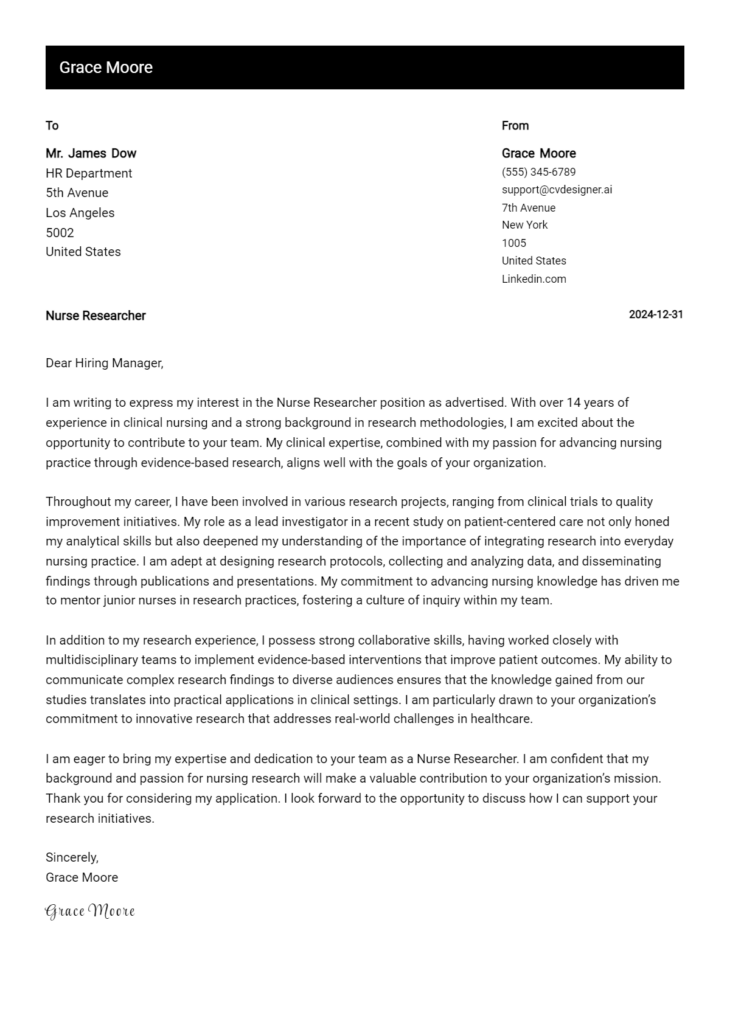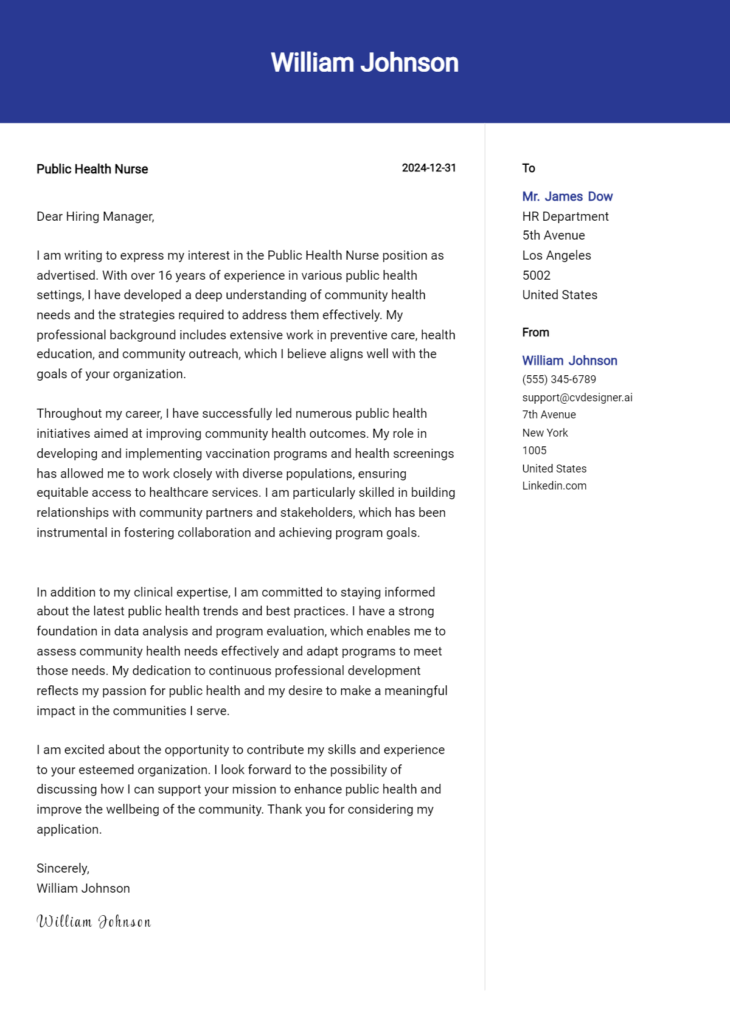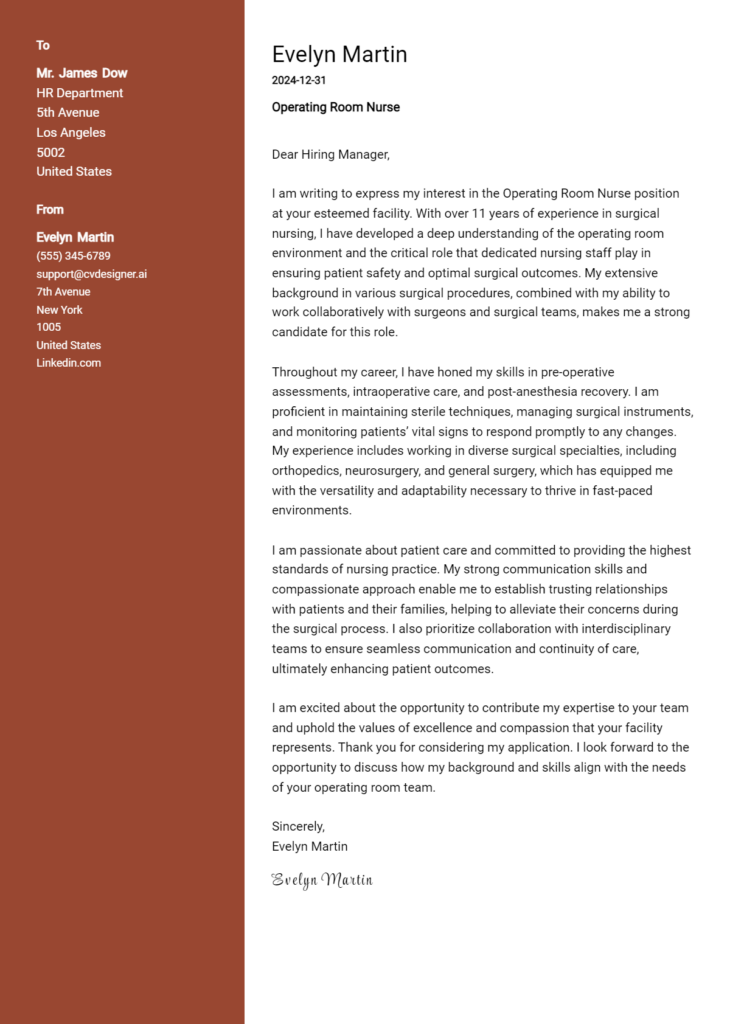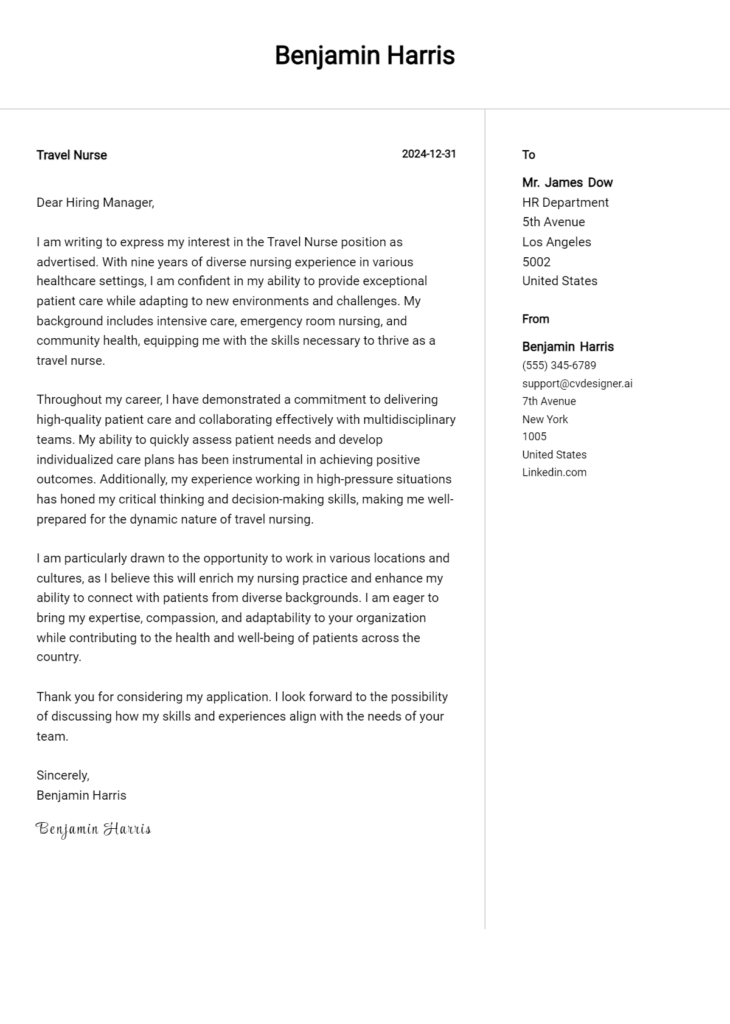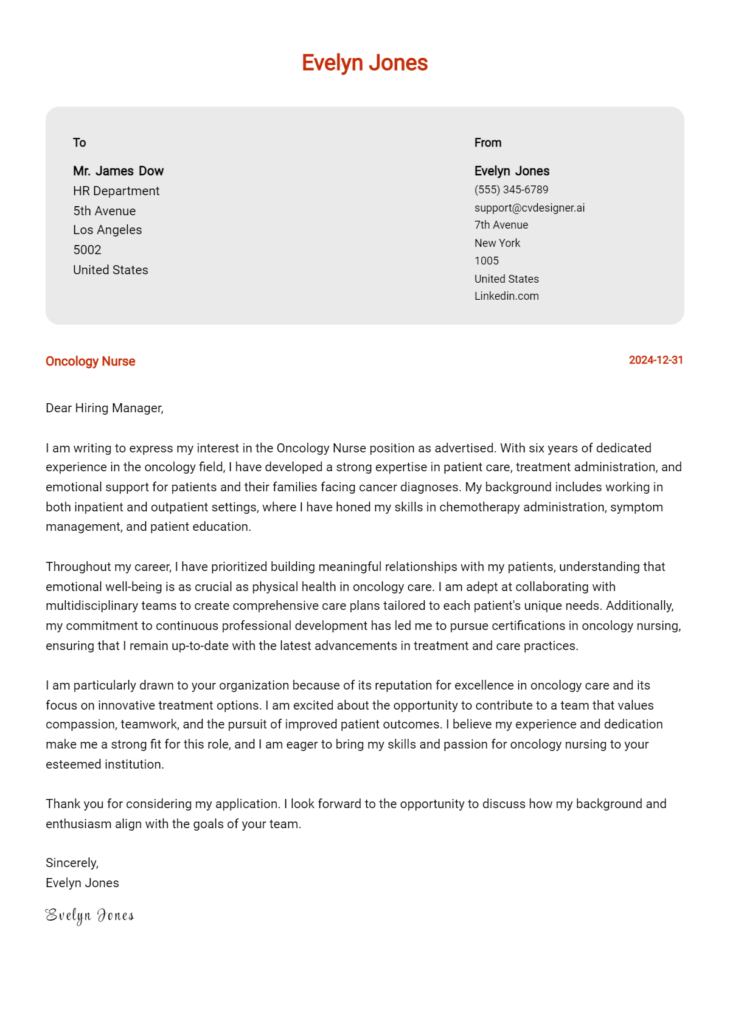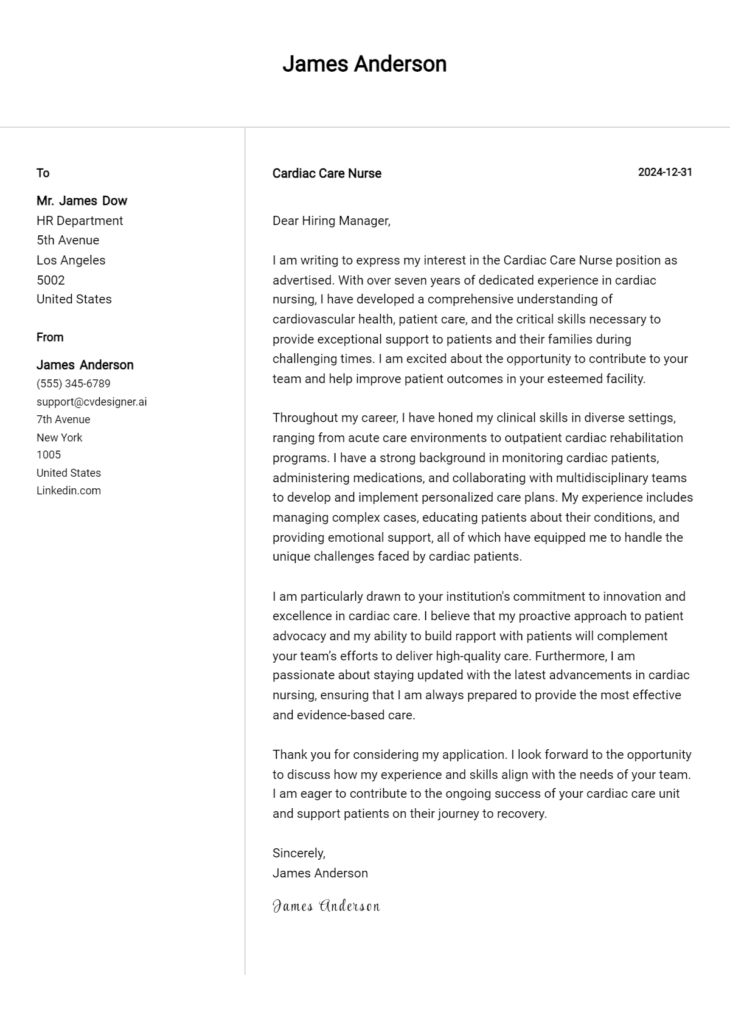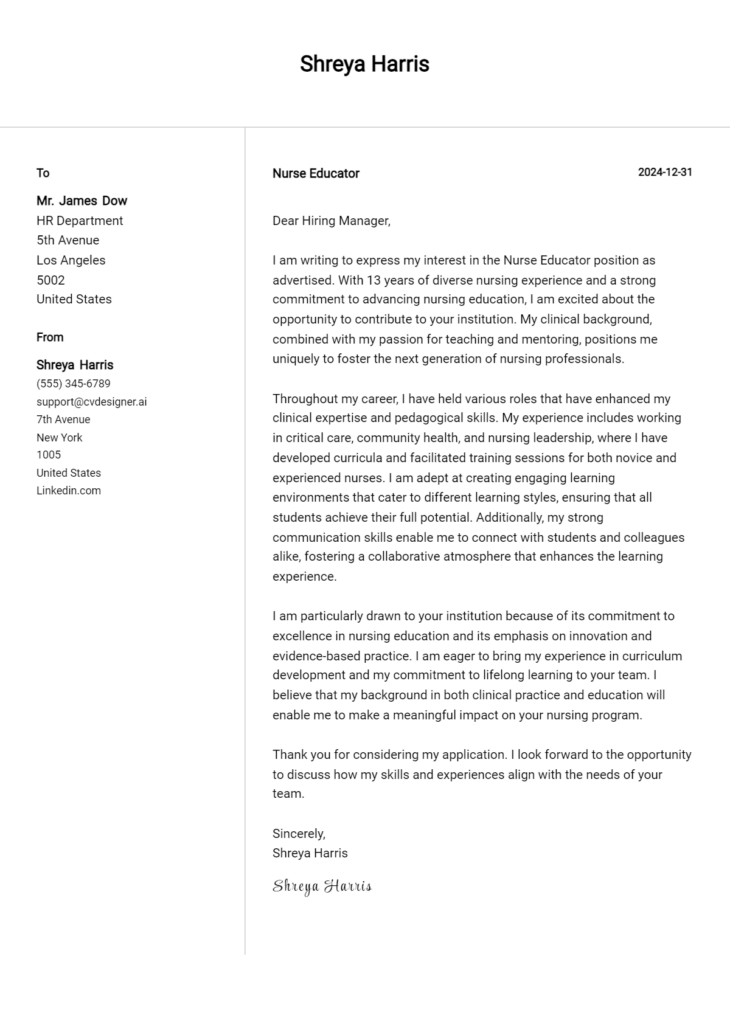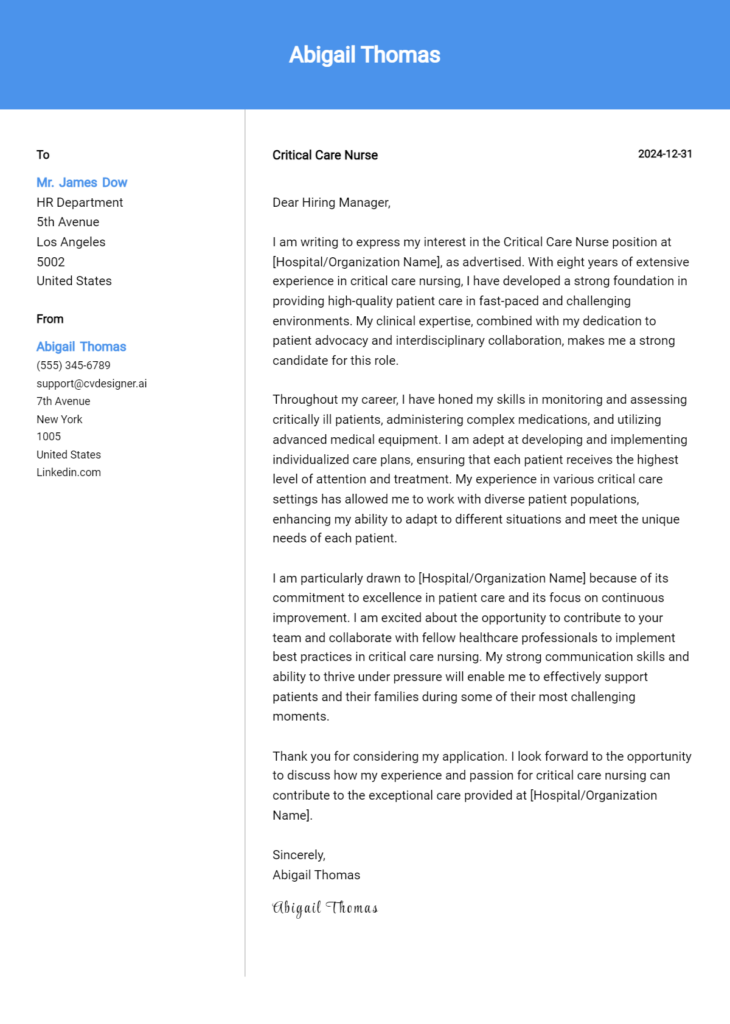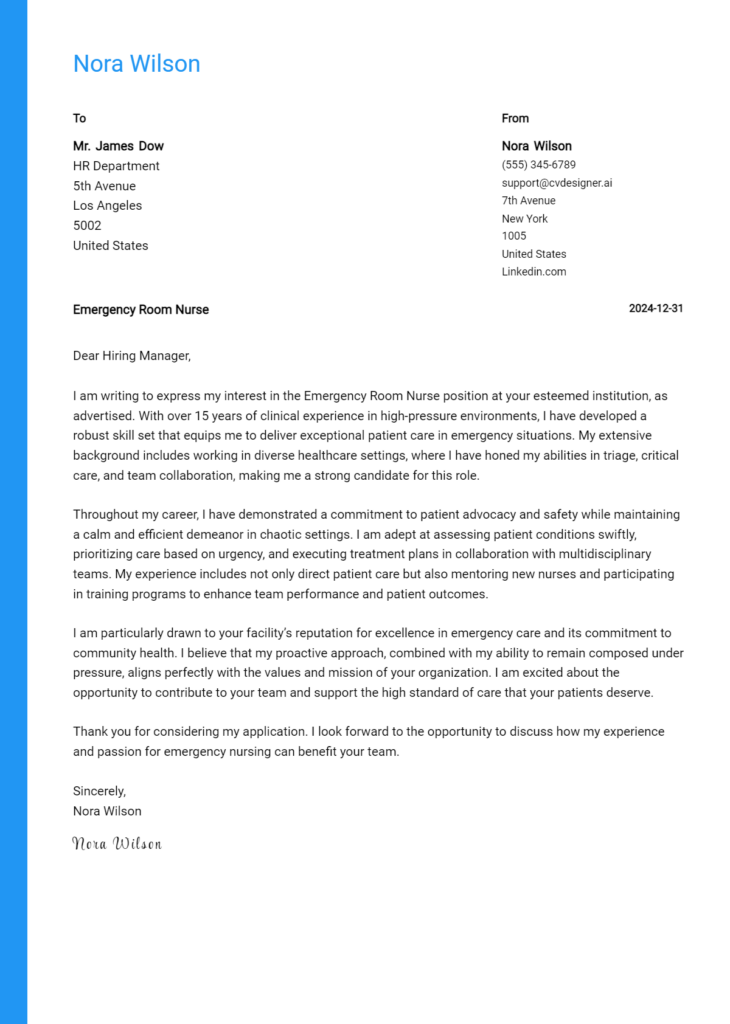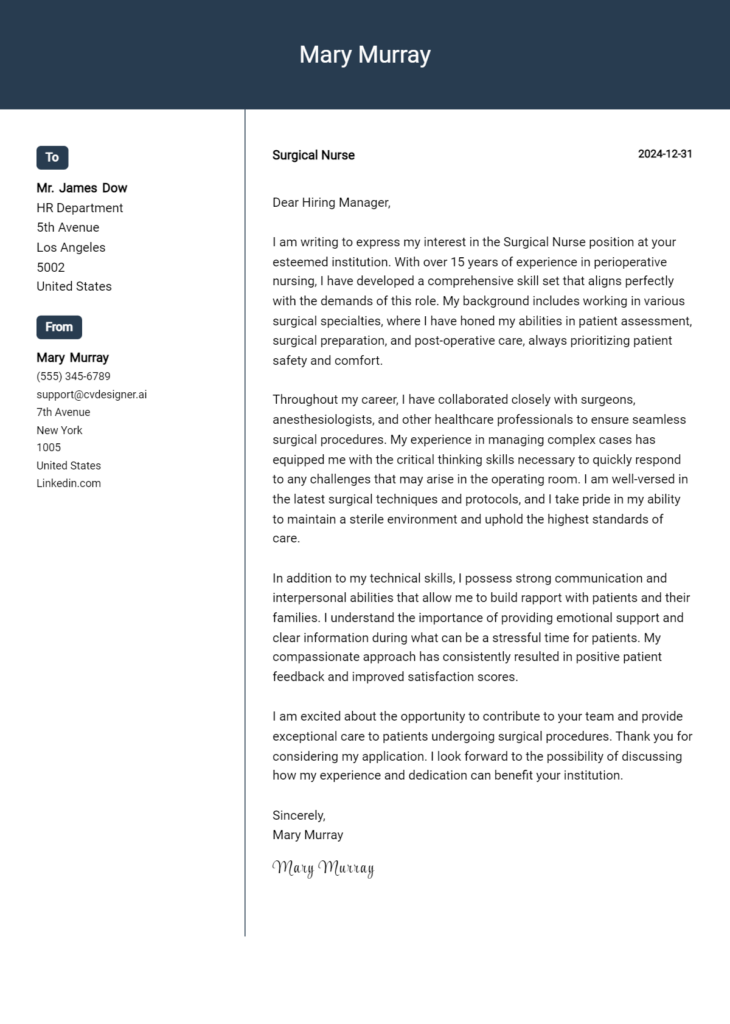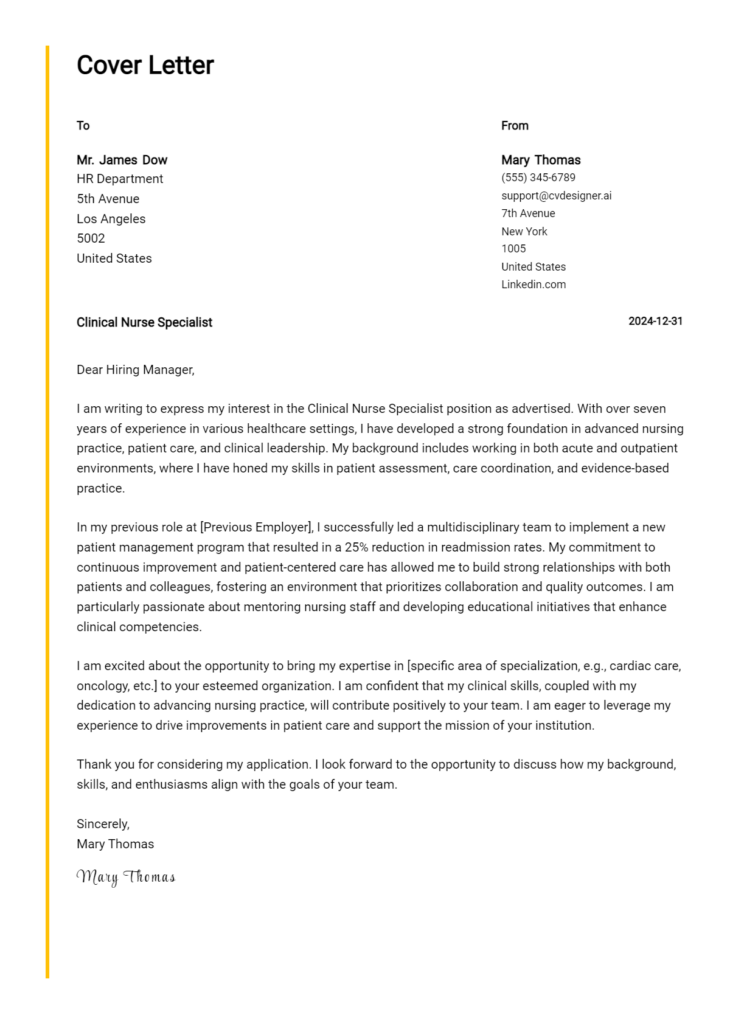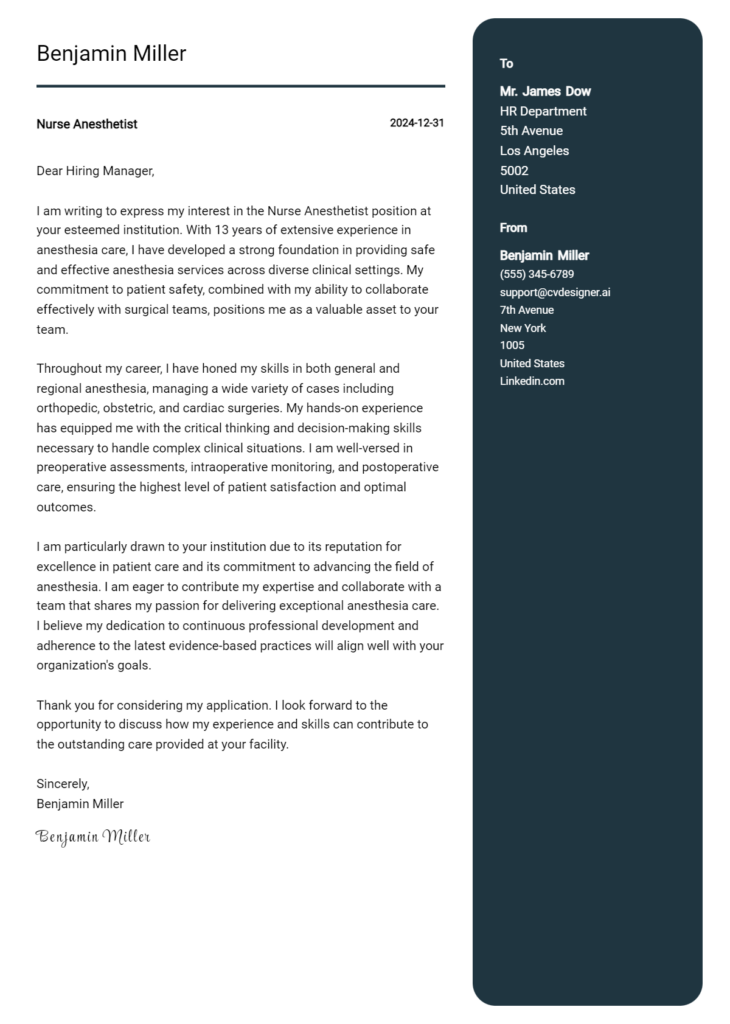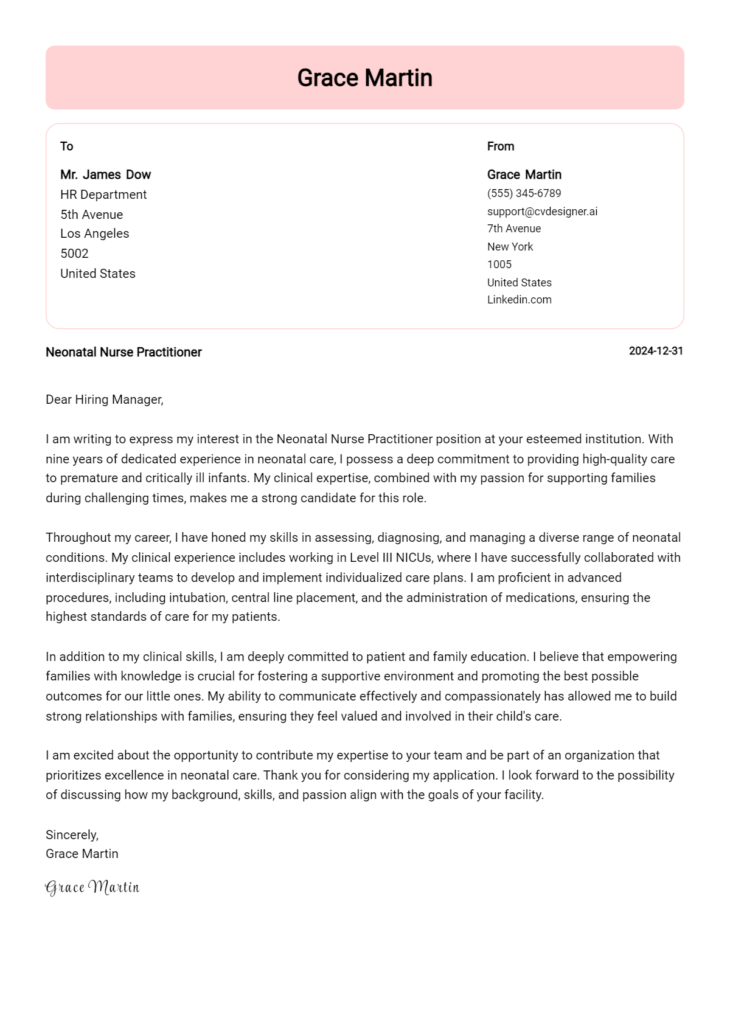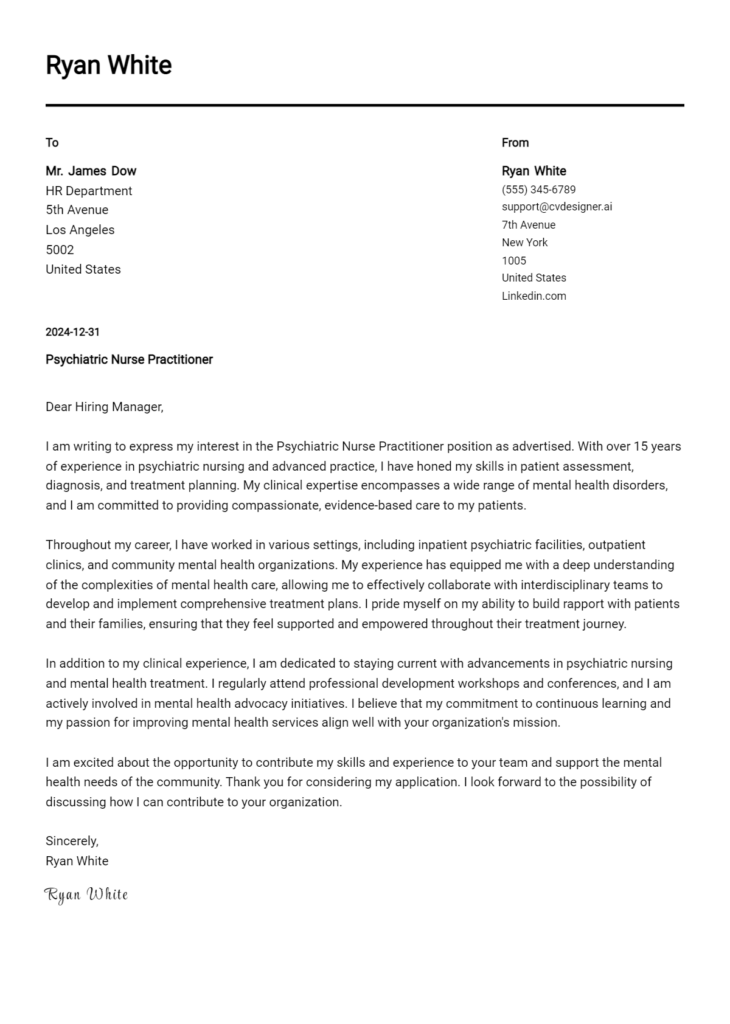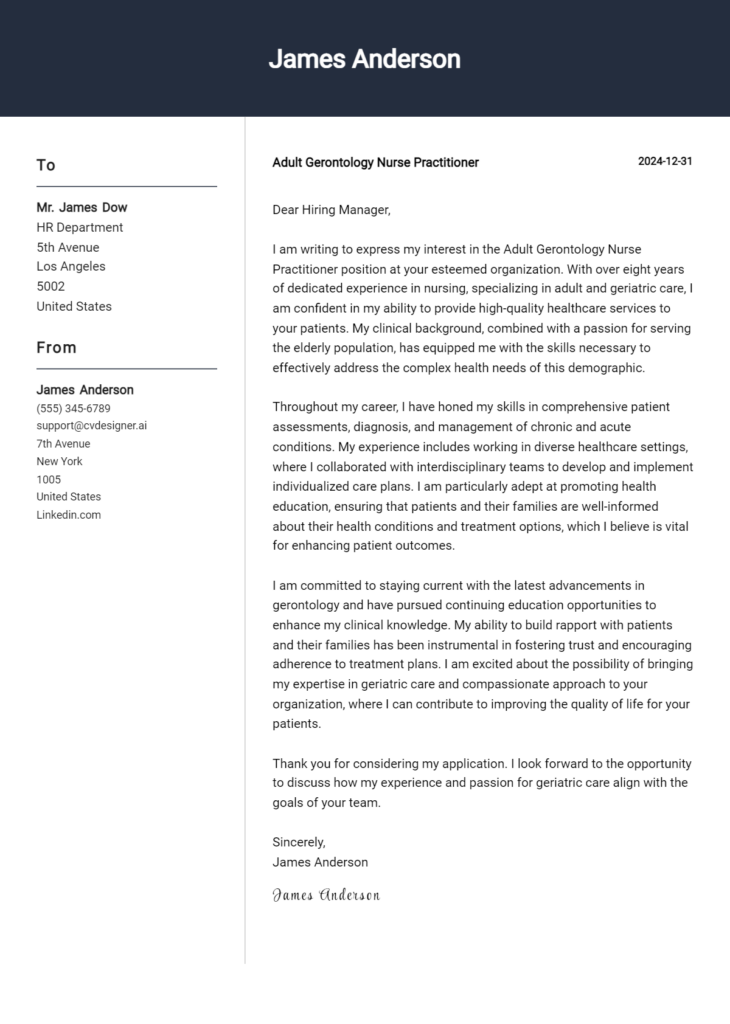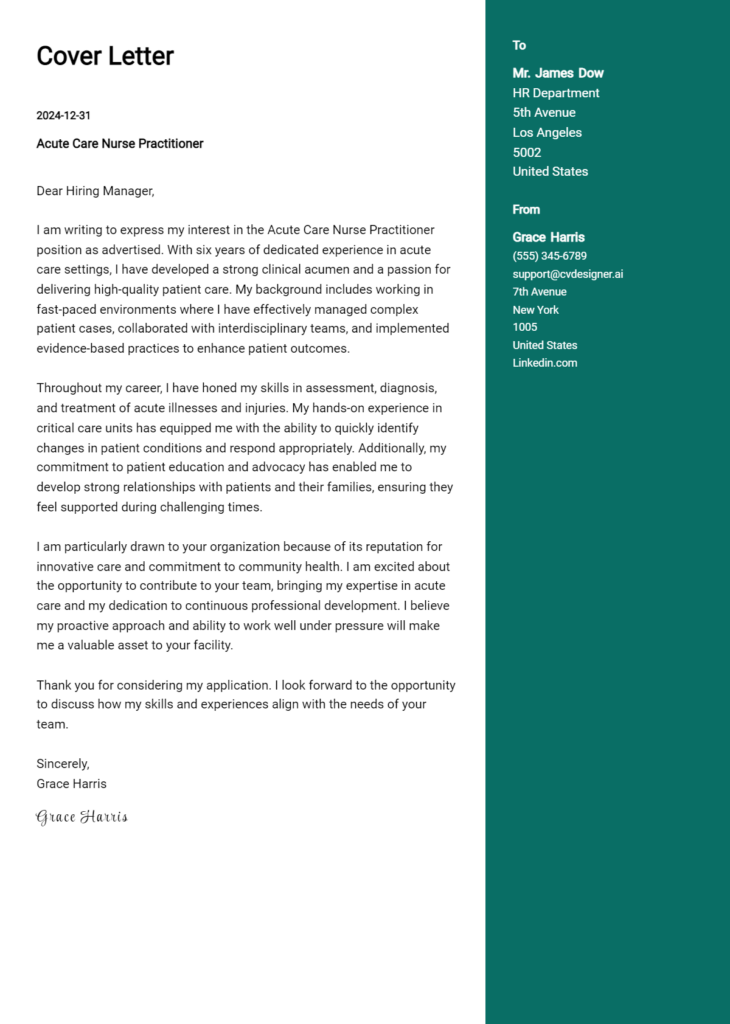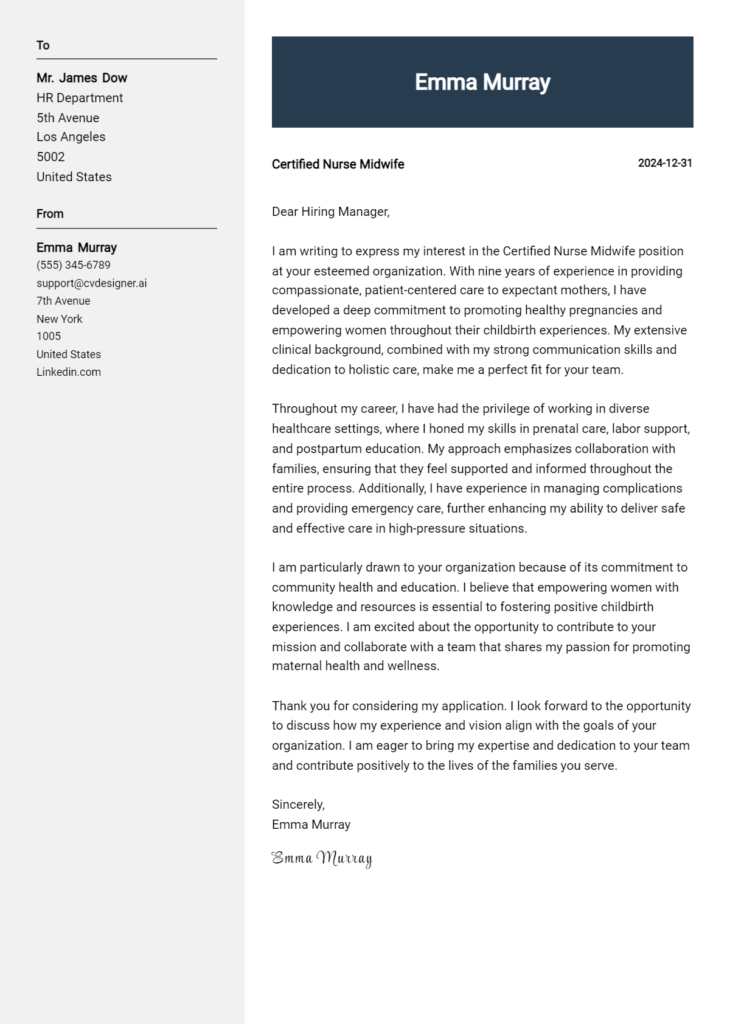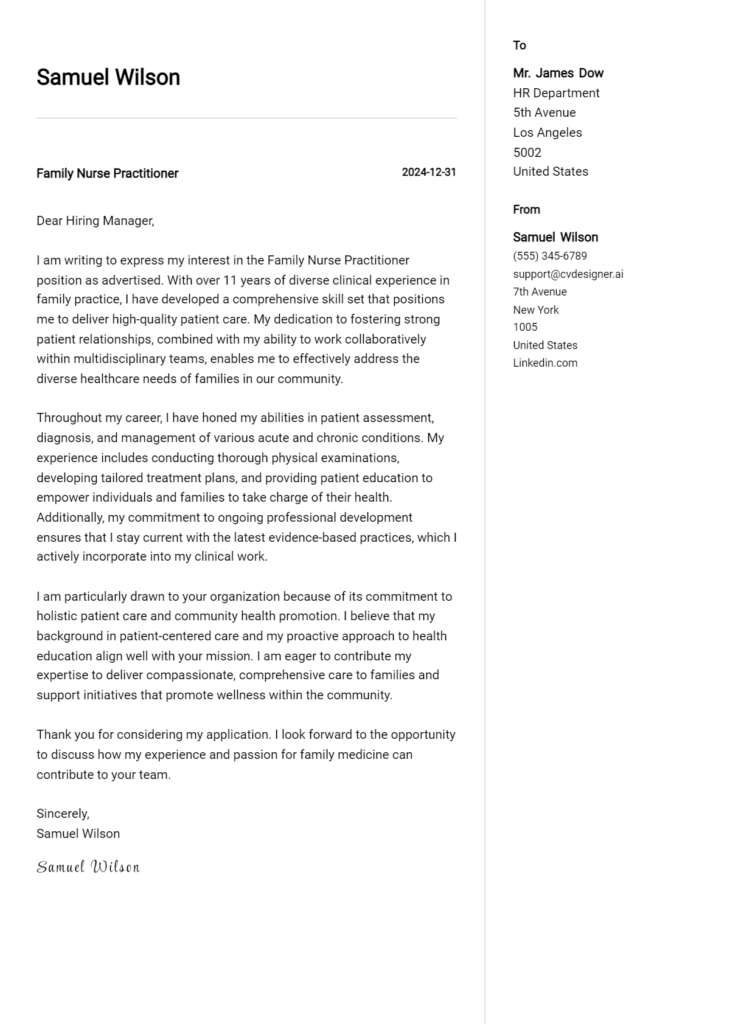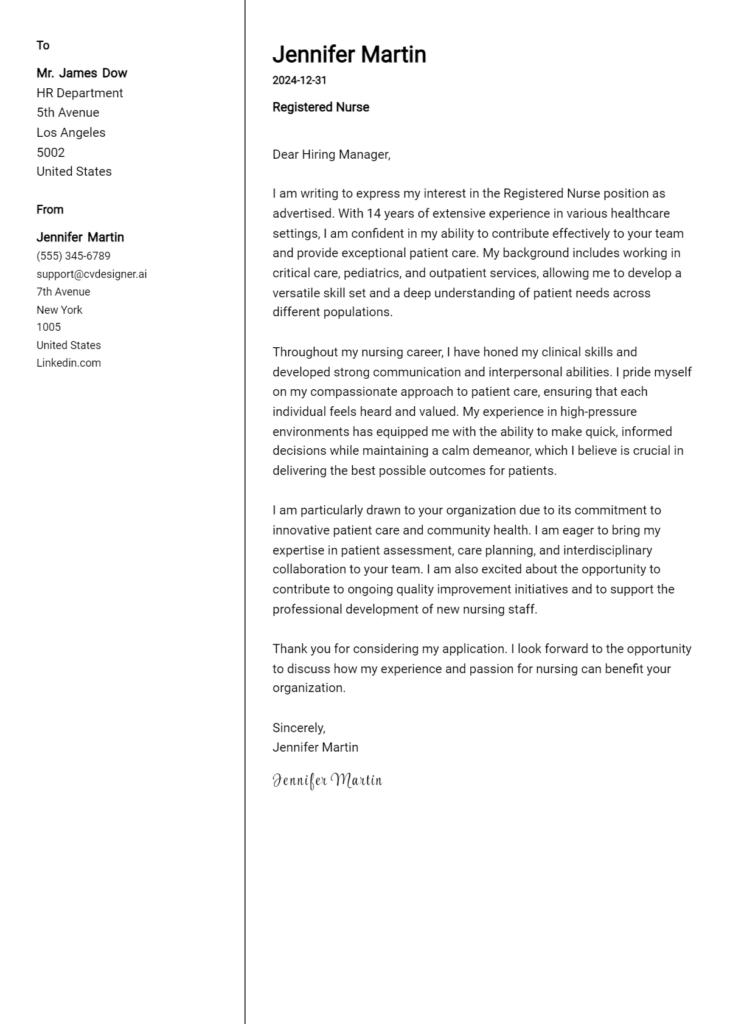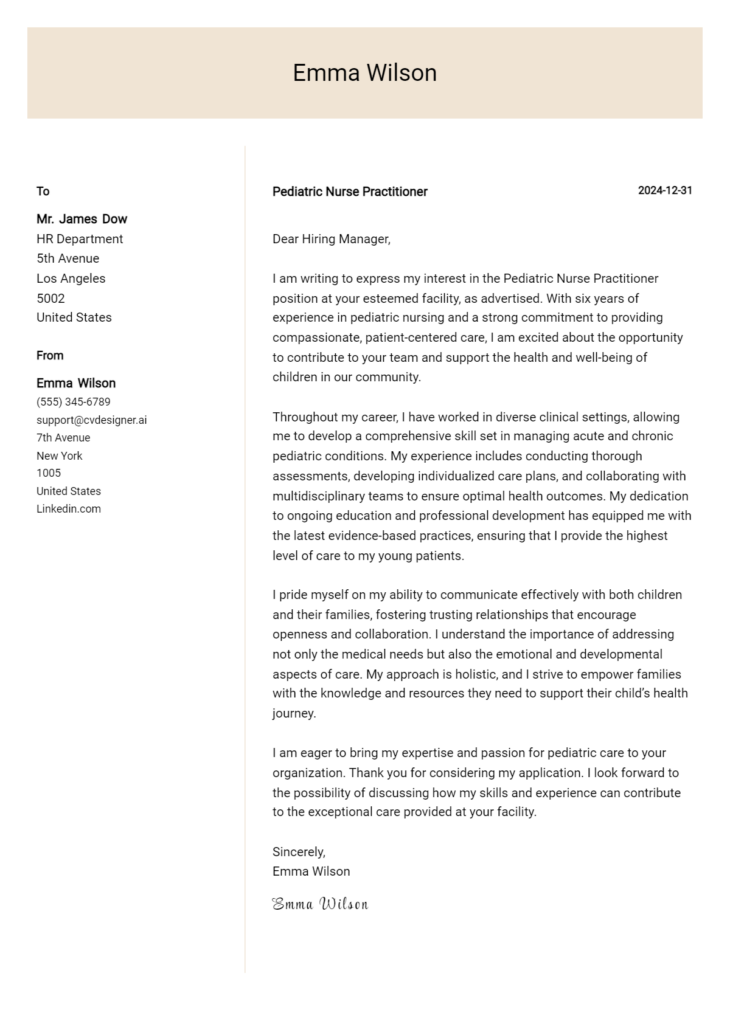Nurse Practitioner Cover Letter Examples
Explore additional Nurse Practitioner cover letter samples and guides and see what works for your level of experience or role.
How to Format a Nurse Practitioner Cover Letter?
Crafting a compelling cover letter is essential for Nurse Practitioners, as it serves as your first opportunity to make a lasting impression on potential employers. The way you format and present your cover letter not only showcases your clinical expertise but also highlights your ability to communicate effectively—an invaluable skill in healthcare. A well-structured cover letter can capture the hiring manager's attention and convey your dedication to patient care and professional excellence.
In this guide, we'll outline how to structure your Nurse Practitioner cover letter, providing insights and examples tailored for the healthcare field.
We will focus on the essential components of a professional cover letter, including:
- Cover Letter Header
- Cover Letter Greeting
- Cover Letter Introduction
- Cover Letter Body
- Cover Letter Closing
Each section plays a crucial role in illustrating your qualifications and commitment to the nursing profession. Let’s break down each part to help you create a standout Nurse Practitioner cover letter.
Importance of a Cover Letter Header for a Nurse Practitioner
A well-structured cover letter header is crucial for a Nurse Practitioner as it sets the tone for the application and conveys professionalism right from the start. The header should include essential information such as the applicant's contact details, the date of writing, and the recipient's information. This clarity ensures that the hiring manager can easily identify the candidate and their intention to apply, which is vital in a competitive job market. A clear and professional header not only showcases attention to detail but also reflects the candidate's understanding of formal communication in the healthcare field.
Strong Example
Jane Doe, NP 123 Health St. Wellness City, ST 12345 (123) 456-7890 jane.doe@email.com October 1, 2023 Hiring Manager Acme Healthcare 456 Care Ave. Healing Town, ST 67890
Weak Example
Jane Nurse October 1, 2023 To Whom It May Concern,
Importance of the Cover Letter Greeting for Nurse Practitioners
The greeting of a cover letter serves as the first impression for potential employers, setting the tone for the rest of the document. A well-crafted greeting showcases professionalism and establishes a personal connection by directly addressing the hiring manager. This approach indicates that the applicant has taken the time to research the position and the organization, demonstrating genuine interest and initiative. To achieve this, candidates should avoid generic greetings such as "To Whom It May Concern." Instead, they should strive to find the name of the hiring manager or the relevant contact person, ensuring that their cover letter feels tailored and specific. Here are some examples to illustrate the difference between strong and weak greetings in a Nurse Practitioner cover letter.
Strong Example
Dear Ms. Smith,
Weak Example
To Whom It May Concern,
The Importance of a Well-Crafted Cover Letter Introduction for a Nurse Practitioner
A well-crafted cover letter introduction is essential for a Nurse Practitioner as it serves as the first impression to the hiring manager. This opening paragraph should not only grab the reader's attention but also convey the candidate’s genuine interest in the role. It should briefly highlight key skills or notable achievements that demonstrate the applicant's qualifications and fit for the position. A strong introduction sets the tone for the rest of the letter, making it crucial for candidates to articulate their strengths effectively.
Strong Example
Dear [Hiring Manager's Name], I am excited to apply for the Nurse Practitioner position at [Facility Name], as advertised on [Job Board/Company Website]. With over five years of experience in primary care and a proven track record of improving patient outcomes through evidence-based practices, I am eager to bring my expertise in chronic disease management and patient education to your esteemed team. My passion for patient advocacy and commitment to delivering compassionate care aligns perfectly with [Facility Name]'s mission to provide exceptional healthcare services.
Weak Example
Dear Sir or Madam, I am writing to apply for the Nurse Practitioner job at your clinic. I have some experience in healthcare and I think it could be a good opportunity for me. I have worked in various settings and I hope to learn more in this role.
Purpose of the Cover Letter Body for a Nurse Practitioner
The cover letter body serves as a pivotal element in a Nurse Practitioner's application, providing an opportunity to illustrate the candidate's relevant skills, experiences, and overall value to the prospective employer. It allows the applicant to go beyond the resume by highlighting specific projects or accomplishments that demonstrate their clinical expertise, patient care philosophy, and ability to contribute effectively to the healthcare team. By detailing past experiences, such as leading successful patient education initiatives or implementing new care protocols, the candidate can paint a vivid picture of their qualifications and how they align with the organization's goals.
Strong Example
As a Nurse Practitioner with over five years of experience in a busy urban clinic, I successfully led a project that reduced patient wait times by 30% through the implementation of a new triage system. This initiative not only improved patient satisfaction but also enhanced the workflow for the entire healthcare team. My background in managing chronic illnesses and conducting comprehensive health assessments has equipped me with the skills necessary to provide high-quality care. I am particularly proud of my role in developing a diabetes management program that has been recognized for its positive outcomes, including a significant decrease in hospital readmissions among participants.
Weak Example
I have worked as a Nurse Practitioner for a few years. I have experience in different areas of nursing. I am a good communicator and work well with patients. I think I would be a good fit for your clinic because I care about my patients and want to help them.
Importance of Cover Letter Closing for Nurse Practitioner
The closing paragraph of a cover letter is crucial, as it provides a final opportunity to summarize your qualifications, express enthusiasm for the position, and encourage the hiring manager to take the next steps, such as reviewing your resume or scheduling an interview. A strong closing leaves a lasting impression, while a weak one may undermine your application. Below are examples of both strong and weak cover letter closings for a Nurse Practitioner role.
Strong Example
Thank you for considering my application for the Nurse Practitioner position at [Hospital/Clinic Name]. With my extensive experience in patient care, my dedication to improving health outcomes, and my passion for community health, I am excited about the opportunity to contribute to your team. I look forward to the possibility of discussing my qualifications in more detail and am eager to bring my skills to [Hospital/Clinic Name]. Please feel free to contact me at your earliest convenience to schedule an interview. Thank you once again for your time and consideration.
Weak Example
Thanks for reading my cover letter. I hope you find my resume interesting. I would like to work at your place, but I'm not sure when I can talk. Maybe we can chat sometime?
Writing a compelling cover letter is essential for Nurse Practitioner candidates aiming to stand out in a competitive job market. A well-crafted cover letter not only highlights your qualifications but also showcases your dedication to patient care and your commitment to continuous learning. To effectively convey your technical skills, problem-solving abilities, knowledge of the Software Development Life Cycle (SDLC), teamwork, and passion for professional growth, consider the following tips as you create your cover letter. Utilizing resources like cover letter templates or a cover letter builder can also enhance your writing process.
Tips for Crafting an Effective Nurse Practitioner Cover Letter
Highlight Relevant Technical Skills: Clearly outline your clinical skills and experience that align with the job description. Mention specific procedures or technologies you are proficient in, such as electronic health records (EHR), diagnostic tools, or telehealth practices. This not only demonstrates your capabilities but also shows your familiarity with the tools that enhance patient care.
Emphasize Problem-Solving Abilities: Share examples of challenging situations you’ve encountered in previous roles and explain how you resolved them. Use the STAR (Situation, Task, Action, Result) method to structure your response. This showcases your critical thinking and adaptability, which are crucial in a fast-paced healthcare environment.
Demonstrate Knowledge of SDLC: If applicable, briefly mention your understanding of the Software Development Life Cycle, especially if you have experience in implementing or using healthcare software systems. This can set you apart as a candidate who not only provides patient care but also contributes to the efficiency of healthcare operations.
Showcase Teamwork and Collaborative Skills: Nurse Practitioners often work in multidisciplinary teams. Highlight your ability to collaborate effectively with physicians, nurses, and other healthcare professionals. Include specific examples of how your teamwork improved patient outcomes or enhanced workflow in your previous positions.
Express a Passion for Continuous Learning: The healthcare field is constantly evolving, and demonstrating your commitment to ongoing education is vital. Mention any recent certifications, training, or workshops you’ve attended. This not only illustrates your dedication to personal growth but also assures potential employers that you will stay current with medical trends and best practices.
By incorporating these elements into your cover letter, you'll present yourself as a well-rounded candidate ready to contribute positively to any healthcare team.
Common Mistakes to Avoid in a Nurse Practitioner Cover Letter
Crafting a compelling cover letter is essential for Nurse Practitioners seeking to make a positive impression on potential employers. Avoiding common mistakes can significantly enhance your chances of landing an interview. Here are some frequent pitfalls to watch out for when writing your cover letter:
Generic Greetings: Using a vague salutation like "To Whom It May Concern" can suggest a lack of effort. Instead, address the hiring manager by name whenever possible.
Repeating Your Resume: A cover letter should complement your resume, not replicate it. Highlight unique experiences or skills that specifically relate to the Nurse Practitioner role.
Lack of Specificity: Failing to tailor your cover letter to the specific job or organization can make it seem impersonal. Research the facility and mention how your skills align with their needs.
Poor Formatting: An unorganized cover letter can deter hiring managers. Adhere to a professional cover letter format to ensure clarity and readability.
Neglecting Proofreading: Spelling and grammatical errors can undermine your professionalism. Thoroughly proofread your cover letter, or ask a colleague to review it.
Overly Long Letters: Keeping your cover letter concise is crucial. Aim for a length of one page to maintain the reader's interest.
Failing to Include a Call to Action: Concluding without a clear call to action may leave your cover letter feeling incomplete. Express your enthusiasm for a follow-up and state your willingness to discuss your qualifications further.
By avoiding these common mistakes and utilizing helpful cover letter examples, you can create a strong and effective cover letter that showcases your qualifications as a Nurse Practitioner.
Cover Letter FAQs for Nurse Practitioner
What should I include in my cover letter as a Nurse Practitioner?
Your cover letter should begin with your contact information, followed by the employer’s details, and a formal greeting. In the body, introduce yourself and specify the Nurse Practitioner position you're applying for. Highlight your relevant qualifications, such as your degree, certifications, and clinical experience. Discuss your clinical skills, patient care philosophy, and any specialties you may have. Include specific examples of your achievements in previous roles, such as improved patient outcomes or successful collaboration with healthcare teams. Finally, express enthusiasm for the role and the organization, and conclude with a strong closing statement, reiterating your interest and availability for an interview.
How long should my cover letter be?
A cover letter for a Nurse Practitioner should ideally be one page long, or about 300-400 words. This length allows you to provide enough detail about your qualifications, experience, and enthusiasm for the position without overwhelming the reader. Use concise, professional language and focus on the most relevant information that aligns with the job description. Each paragraph should serve a purpose: the introduction, the body where you outline your qualifications and experiences, and a conclusion that reinforces your interest and prompts the employer to consider you for an interview.
How can I make my cover letter stand out?
To make your cover letter stand out, tailor it specifically to the job you are applying for. Research the organization and incorporate their values or mission into your letter to show that you share their vision. Use strong action verbs and quantify your achievements when possible, such as stating the percentage of patient satisfaction improvement you contributed to in your previous role. Personalize the letter by addressing it to a specific person, if possible, and avoid generic phrases. Finally, convey your passion for nursing and patient care, showing that you are not just looking for any job, but are genuinely interested in this particular position.
Should I include references in my cover letter?
Typically, you do not need to include references in your cover letter. Instead, focus on showcasing your skills, experiences, and suitability for the Nurse Practitioner role. If the job posting specifically requests references, you can mention that they are available upon request. In this case, prepare a separate reference list to provide if asked. Instead of listing references, use the cover letter to create a narrative around your qualifications and experiences that would prompt the hiring manager to want to learn more about you and your professional background.
Build your Cover Letter in minutes
Use an AI-powered cover letter builder and have your letter done in 5 minutes. Just select your template and our software will guide you through the process.

